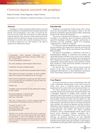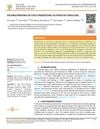 1 citations,
November 1990 in “International Journal of Dermatology”
1 citations,
November 1990 in “International Journal of Dermatology” Even a small melanoma can be deadly if not removed, regardless of the patient's age.
 1 citations,
January 1967 in “The BMJ”
1 citations,
January 1967 in “The BMJ” The document concludes that while some hair and scalp disorders can be treated, hair loss from destroyed follicles is permanent, and damaged hair can only regrow naturally.
 October 2024 in “Frontiers in Oncology”
October 2024 in “Frontiers in Oncology” Keratin 18 helps diagnose and predict cancer progression and affects cancer growth and spread.
[object Object]  April 2024 in “Bioscience trends”
April 2024 in “Bioscience trends” Higher levels of certain DNAs in blood may indicate hair follicle damage in alopecia areata patients.
 February 2024 in “Sohag Medical Journal”
February 2024 in “Sohag Medical Journal” Various local treatments for alopecia areata show promise, but individualized plans and more research are needed.
 January 2024 in “Dermatology practical & conceptual”
January 2024 in “Dermatology practical & conceptual” Male gender and family history predict alopecia areata recurrence.
 January 2024 in “International Ayurvedic medical journal”
January 2024 in “International Ayurvedic medical journal” Certain Prakruti types are more prone to early male pattern baldness.
 January 2024 in “Archives of dermatological research”
January 2024 in “Archives of dermatological research” Both treatments for alopecia areata showed similar modest effectiveness.
 January 2024 in “Jurnal Ilmu Kesehatan Hewan”
January 2024 in “Jurnal Ilmu Kesehatan Hewan” A mixed breed dog with skin issues improved significantly after treatment and needs to avoid dampness and certain bath products to prevent it from coming back.
 December 2023 in “Journal of health and rehabilitation research”
December 2023 in “Journal of health and rehabilitation research” Oral Apremilast effectively treats alopecia areata in most patients.
 September 2023 in “Jurnal Ilmu Kesehatan Hewan”
September 2023 in “Jurnal Ilmu Kesehatan Hewan” The dog improved significantly after treatment for skin mites and fungi.
 September 2023 in “Frontiers in bioengineering and biotechnology”
September 2023 in “Frontiers in bioengineering and biotechnology” JAGGED1 could help regenerate tissues for bone loss and heart damage if delivered correctly.
 September 2023 in “International journal of medicine”
September 2023 in “International journal of medicine” AI is revolutionizing healthcare by improving diagnosis, treatment, and monitoring, but still needs close supervision.

Tjalma Syndrome is a rare condition in people with lupus, causing fluid buildup and high CA-125 levels, but not due to tumors.

Higher disease activity in systemic lupus erythematosus is strongly linked to more internal organ damage.
 June 2023 in “Oriental Journal of Chemistry/Oriental journal of chemistry”
June 2023 in “Oriental Journal of Chemistry/Oriental journal of chemistry” New compounds may help treat prostate cancer by reducing cell growth.
 June 2023 in “Research Square (Research Square)”
June 2023 in “Research Square (Research Square)” Different immune responses cause hair loss in scalp diseases, with unique patterns in scalp psoriasis possibly protecting against hair loss.

Non-invasive methods can effectively diagnose and manage alopecia areata.
 June 2023 in “Dermatology reports”
June 2023 in “Dermatology reports” The link between pemphigus and the patient's scarring hair loss is still unclear.

Deleting Smad4 and PTEN genes in mice causes rapid, invasive stomach cancer.

Deleting Smad4 and PTEN genes in mice causes rapid, invasive forestomach cancer.
[object Object]  January 2023 in “Asian Journal of Pediatric Research”
January 2023 in “Asian Journal of Pediatric Research” Trichoscopy is crucial for diagnosing and assessing alopecia areata in children.
 September 2022 in “Dermatology and therapy”
September 2022 in “Dermatology and therapy” Contact immunotherapy might help treat various skin conditions, but more research is needed to confirm its safety and effectiveness.
 March 2022 in “Research Square (Research Square)”
March 2022 in “Research Square (Research Square)” A girl with severe hair loss saw hair regrowth after using cannabis.
 January 2022 in “Open Access Macedonian Journal of Medical Sciences”
January 2022 in “Open Access Macedonian Journal of Medical Sciences” A 5-year-old boy with alopecia totalis had temporary hair regrowth with treatment but relapsed, highlighting the need for thorough investigation and holistic care.
 December 2021 in “Aegean journal of obstetrics and gynecology”
December 2021 in “Aegean journal of obstetrics and gynecology” A woman's male-like physical changes were caused by two rare ovarian conditions.
 December 2021 in “International journal of research - granthaalayah”
December 2021 in “International journal of research - granthaalayah” A young woman had a rare, usually non-cancerous tumor on her face that was initially mistaken for a different condition.
 October 2021 in “Dermatology practical & conceptual”
October 2021 in “Dermatology practical & conceptual” High-dose corticosteroids can significantly regrow hair in severe alopecia areata.
 October 2021 in “The Egyptian Journal of Hospital Medicine”
October 2021 in “The Egyptian Journal of Hospital Medicine” Alopecia areata causes patchy hair loss and involves immune system disruptions.
 September 2021 in “Revista Interdisciplinar em Saúde”
September 2021 in “Revista Interdisciplinar em Saúde” Oral isotretinoína effectively stabilizes frontal fibrosing alopecia.






























